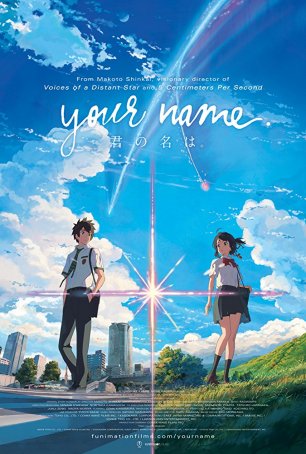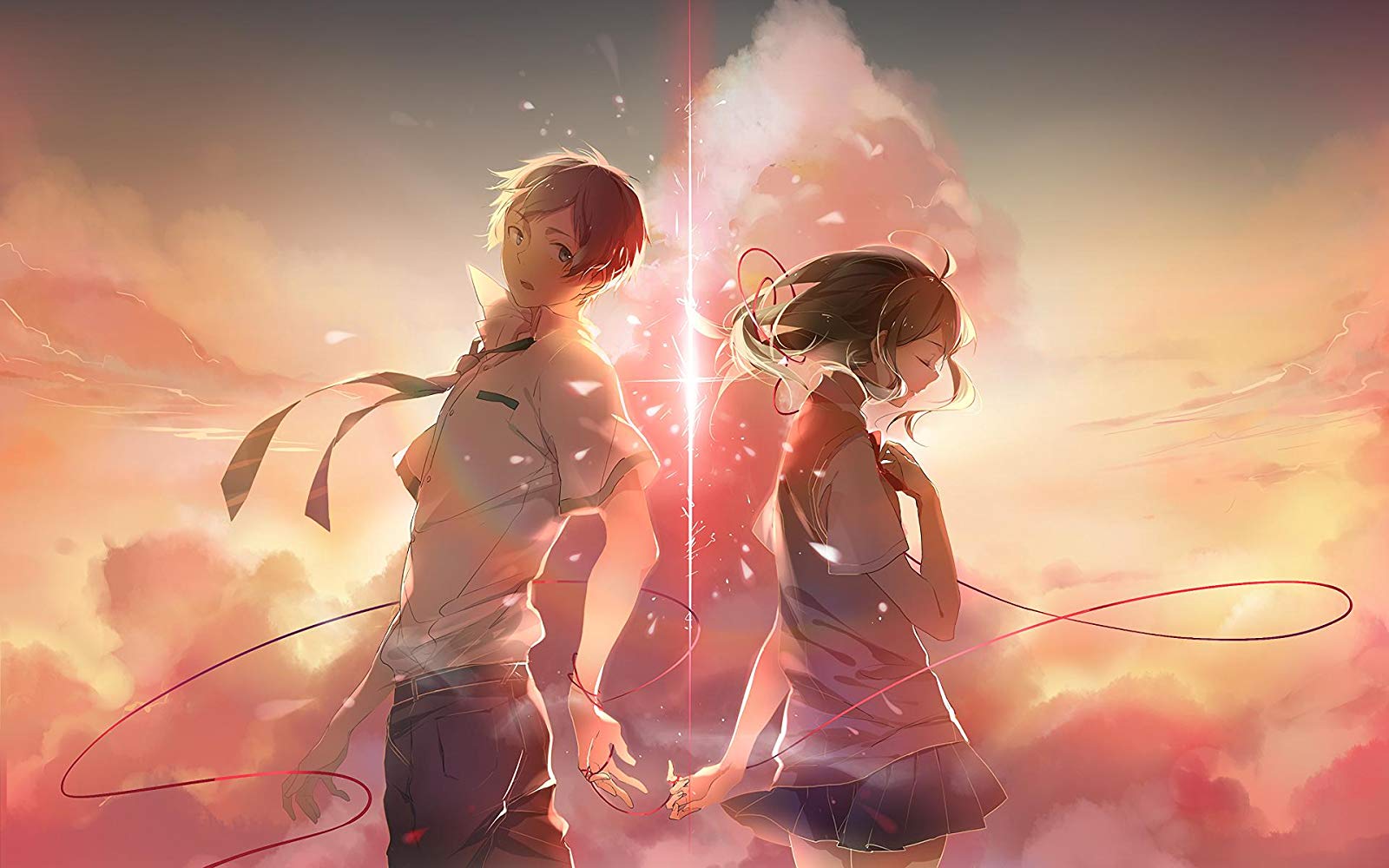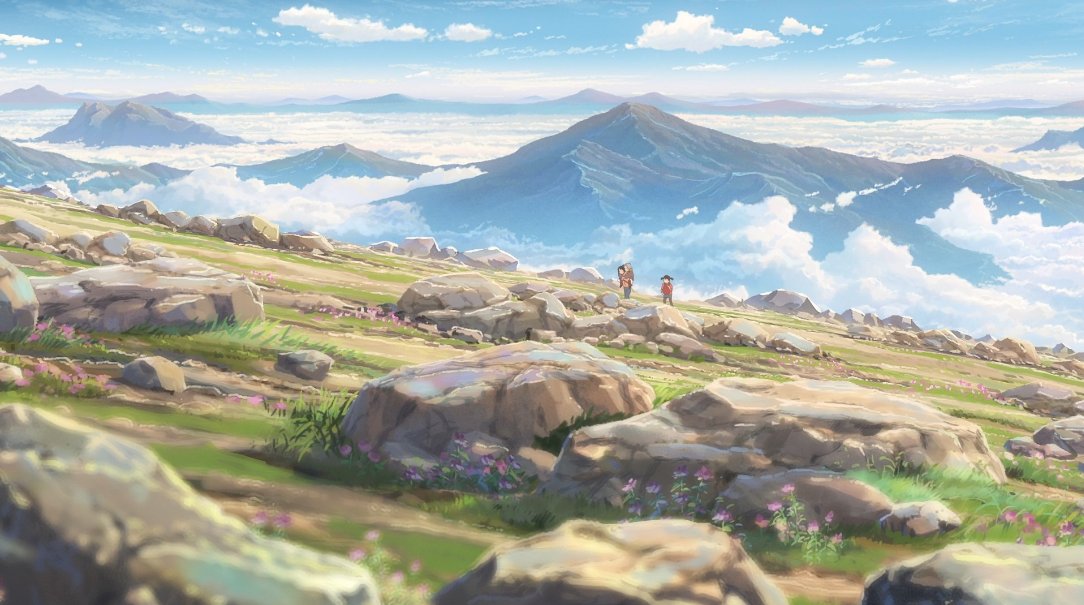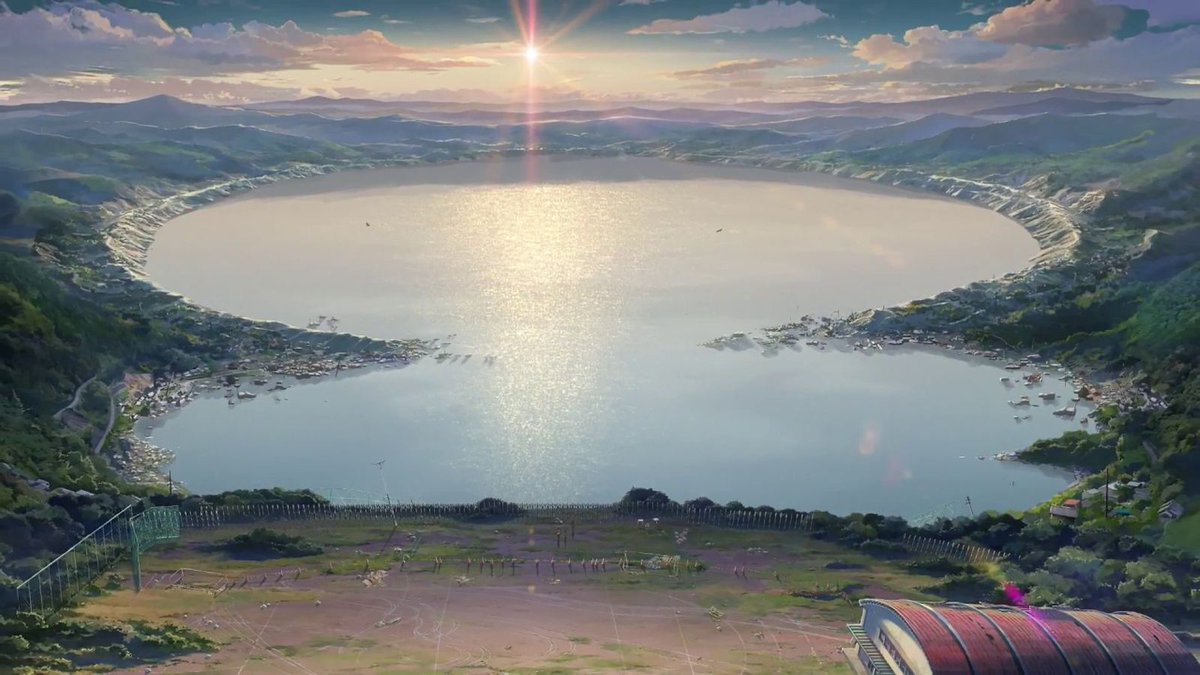Your Name (Japan, 2016)
September 21, 2018
Your Name, the 2016 animated film from Makoto Shinkai, was a critical and commercial success in its native Japan, where it became the fourth-highest grossing film of all time and second highest-grossing anime (behind Hayao Miyazaki’s Spirited Away). A metaphysical fantasy that doubles as a meditation on identity and connection, the story unfolds as an atypical love story that involves body-swapping and time travel. Combining such diverse genres as teen/high school romances, disaster movies, and ghost stories, Your Name covers a vast canvas. Although there are times when the story loses its focus (mostly during the scattershot and occasionally confusing second half), the overall impression is one of satisfaction and the animation is better than anything to emerge from Japan since Miyazaki “retired.”
 Your Name begins
by introducing the main characters: a high school girl named Mitsuha (Mone
Kamishiraishi) who lives in the rural town of Itomori and a Tokyo teenager
named Taki (Ryunosuke Kamiki). The two share a connection, the depth of which
gradually becomes apparent. One morning, Taki wakes up in Mitsuha’s body (and
she in his). The two have to navigate the day in unfamiliar surroundings with
“friends” they don’t know. At night, they return “home,” only to again switch
bodies a few days later. After this happens a few times, they figure out ways
to communicate with each another – leaving notes in Mitsuha’s notebook and on
Taki’s phone. Mitsuha contrives to arrange a date between Taki and his
long-time crush, Miki Okudera (Nobunaga Shimazaki), and Taki elevates Mitsuha’s
high school popularity. Then, even as the two who have never met are falling in
love with one another, it comes to a halt. A visit to the mountainous Hida
region by Taki reveals the truth about Mitsuha’s fate and why their swapping
stopped.
Your Name begins
by introducing the main characters: a high school girl named Mitsuha (Mone
Kamishiraishi) who lives in the rural town of Itomori and a Tokyo teenager
named Taki (Ryunosuke Kamiki). The two share a connection, the depth of which
gradually becomes apparent. One morning, Taki wakes up in Mitsuha’s body (and
she in his). The two have to navigate the day in unfamiliar surroundings with
“friends” they don’t know. At night, they return “home,” only to again switch
bodies a few days later. After this happens a few times, they figure out ways
to communicate with each another – leaving notes in Mitsuha’s notebook and on
Taki’s phone. Mitsuha contrives to arrange a date between Taki and his
long-time crush, Miki Okudera (Nobunaga Shimazaki), and Taki elevates Mitsuha’s
high school popularity. Then, even as the two who have never met are falling in
love with one another, it comes to a halt. A visit to the mountainous Hida
region by Taki reveals the truth about Mitsuha’s fate and why their swapping
stopped.
Your Name’s first half is magical. There’s a richness of human comedy and whimsy in the way Mitsuha and Taki navigate their day-to-day lives without knowing in whose body they will awaken. Taki’s curiosity about “his” breasts creates one of many lighthearted moments and the ways in which the pair communicate – and learn to love one another – is presented with economy and a deftness of touch. Your Name loses some of that clarity and appeal during its second half as mystical and quasi-science fiction elements creep in. The travel back-and-forth between Tokyo and Itomori and Mitsuha’s attempts to avert disaster feel like unnecessary distractions incorporated to add “action” to an otherwise contemplative film. Some plot elements – specifically the means by which Mitsuha and Taki are able to communicate face-to-face – are a little confusing.
 The artwork is stunning. As with most contemporary Japanese
anime, Shinkai combines traditional hand-drawn animation with rotoscoping and
CGI. The film’s backgrounds are based on actual photographs and the characters
are recognizably human, albeit with the exaggerations (particularly the eyes)
expected from anime models. A rigorous attention to detail is maintained (notice
the fan blades turning in one scene) and the characters’ movements are fluid
and natural. The look is a step up from that of Shinkai’s The Garden of Words, which was already at a high level. Overall,
the effect is like a cross between early 1990s Disney and 2000s Miyazaki.
(Shinkai has been called “the next Miyazaki,” a comparison he brushes off.)
The artwork is stunning. As with most contemporary Japanese
anime, Shinkai combines traditional hand-drawn animation with rotoscoping and
CGI. The film’s backgrounds are based on actual photographs and the characters
are recognizably human, albeit with the exaggerations (particularly the eyes)
expected from anime models. A rigorous attention to detail is maintained (notice
the fan blades turning in one scene) and the characters’ movements are fluid
and natural. The look is a step up from that of Shinkai’s The Garden of Words, which was already at a high level. Overall,
the effect is like a cross between early 1990s Disney and 2000s Miyazaki.
(Shinkai has been called “the next Miyazaki,” a comparison he brushes off.)
 Thematically, the film covers much ground but the most
apparent concepts involve how people connect, the nature of dreams, and what
comprises the nebulous concept of “identity.” When Mitsuha and Taki have
switched bodies, who are they really? To what degree are we defined by our
personality and/or our appearance? What’s more important: continuity of body or
continuity of mind? These questions are presented subtly and without clear
answers but they’re the kinds of things the viewer thinks of while watching Your Name. The film also works on a less
philosophical, more basic level: that of a romance where the characters are
separated not only by place but by time. The disaster elements draw heavily
from the 2011 earthquake, whose deep and lasting impact influenced Shinkai when
he was sketching out the story (in 2013) that became Your Name.
Thematically, the film covers much ground but the most
apparent concepts involve how people connect, the nature of dreams, and what
comprises the nebulous concept of “identity.” When Mitsuha and Taki have
switched bodies, who are they really? To what degree are we defined by our
personality and/or our appearance? What’s more important: continuity of body or
continuity of mind? These questions are presented subtly and without clear
answers but they’re the kinds of things the viewer thinks of while watching Your Name. The film also works on a less
philosophical, more basic level: that of a romance where the characters are
separated not only by place but by time. The disaster elements draw heavily
from the 2011 earthquake, whose deep and lasting impact influenced Shinkai when
he was sketching out the story (in 2013) that became Your Name.
Despite Your Name’s success in Japan and at international film festivals, it received only a perfunctory North American release and was largely unavailable to U.S. audiences until it debuted on DVD. The home video version offers both the original Japanese version with subtitles and an English dub. The latter, despite (or perhaps because of) not featuring any well-known names, is significantly better than any of the Miyazaki dubs and Radwimps (credited with the music) recorded English-language versions of the songs. Regardless of how you watch it, however, Your Name is worth the time. Plot hiccups aside, it’s a visually impressive experience with endearing characters and a unique story.
Your Name (Japan, 2016)
Cast: Ryunosuke Kamiki, Mone Kamishiraishi, Masami Nagasawa, Ryo Narita, Aoi Yuki, Nobunaga Shimazaki, Kanon Tani, Masaki Terasoma
Home Release Date: 2018-09-21
Screenplay: Makoto Shinkai
Cinematography: Makoto Shinkai
Music: Radwimps
U.S. Distributor: Funimation Films
- Godzilla Minus One (2023)
- (There are no more better movies of Ryunosuke Kamiki)
- (There are no more worst movies of Ryunosuke Kamiki)
- (There are no more better movies of Mone Kamishiraishi)
- (There are no more worst movies of Mone Kamishiraishi)
- (There are no more better movies of Masami Nagasawa)
- Before We Vanish (2018)
- (There are no more worst movies of Masami Nagasawa)

Comments